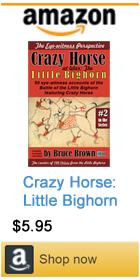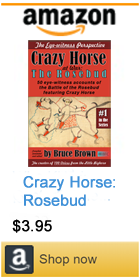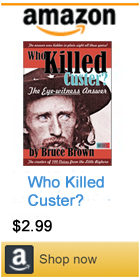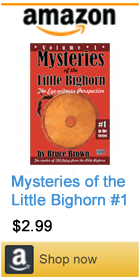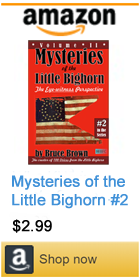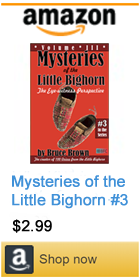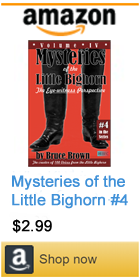|
||||||||||||
Bruce Brown's 100 Voices... Roman Rutten's Story of the Battle
THE STORY OF PRIVATE ROMAN RUTTEN
Rutten was not wounded in this movement (as Wm. E. Morris states) but was wounded in the shoulder on the hill the next day. Says Sergt. O'Hara was first man killed, and he fell on skirmish line.2 Soon all went into the timber and began to mount up. He heard lst Sergt. Ryan ask Capt. French where they were going or where he (French) thought they had better go, and while French's mind seemed to be diverted for the moment, as though he was considering what answer to make, Reno rode past to the border of the timber and cried: "Everybody follow me." Lorentz was hit in the timber, and Streing outside but near the edge of the timber.3 As Rutten left the timber, a solid line of Indians, as many as 200, he would think, rode up on his right and had stopped or nearly stopped, and were doing some very loud yelling as the soldiers were getting out of the timber. A few of these Indians were firing into the retreating soldiers but most of them were giving vent to a variety of Ha Ha's and Haw Haws, apparently being about as badly excited as the soldiers and apparently undecided as to what movement the soldiers were about to execute. Rutten was not long in leaving these unwelcome spectators behind, but there were already Indians ahead and plenty of them riding along on the right. A little way from the timber Isaiah's horse had been shot down, and the colored man was making a stand, down on one knee, cooly firing his sporting rifle. Isaiah [Isaiah Dorman, black scout for the Seventh Cavalry] and I were intimate acquaintances, and as I passed him he looked up at me and cried out, "Goodbye Rutten." Corpl. Scollin fell in some low or soggy ground not far from the timber, and beyond this some distance was Lieut. McIntosh trying to make his way.4 He was singled out by himself, and he was trying to urge his horse along but was not succeeding well. His lariat was dragging, which seemed to bother the horse. McIntosh was surrounded by twenty or thirty Indians, who were circling about him, apparently determined to get him. Rutten's horse now smelled Indians stronger than before and he knew exactly what to do, without any communication by bit or spur, so that all Rutten had to do was to stay in the saddle. The horse tore right across the circle of Indians of which McIntosh was the center, and on he went. The horse did not like the sight of Indians at the right, and so he veered to the left among some stumps and logs, but these were no obstacle to him. He did not take time to run around any of these but jumped right over them, keeping a straight course. When I reached the river, the water ahead of me was full of horses and men struggling to get across. I thought I had better keep out of the muddle and so turned my horse downstream. The opposite bank was high and steep, and men were riding both upstream and downstream trying to find some place to get up. Finally the mob of horsemen made for a narrow trail cut by buffalo in going for water, which cut through the steep bank at a moderate incline. Before I reached it, a horse had fallen exhausted or shot right in this cut and was choking the passage, but he was pulled out. How it was done and so quickly, I did not see nor did I stop to inquire. The run up through this cut was a hard test of horseflesh. Rutten tells how in the fight on the hill during a.m. of June 26 Benteen [Capt. Frederick Benteen] came over and told how rapidly he was losing his men and that if he did not get assistance soon, he could not hold his hill, and he quietly remarked that if his hill was carried by Indians the remaining six companies would not last long. Benteen discussed the matter with Reno, who finally said he might take one of the companies on that side, and Benteen, without discussing which one he was to have, said: "All right, I will take French." French was informed about this and immediately went along the line and told his men to be still but be ready, when he would give the word, to jump up and run for Benteen's line. Benteen's line, being on the highest ground in the vicinity,5 the men going to his assistance would be clearly exposed for some 100 yards while going up the slope. At French's word all the men present, but not all of the available men of the company, leaped to their feet, scattered, and started up the hill. In this run Wilber was wounded. Rutten heard the Peter Thompson story and also about the man (Nathan Short) who got to the Rosebud. Rutten says Botzer was acting 1st sergeant of Co. G. Rafter says this is so. Says Alex Brown was with packs. Vickory (color sgt.) was carrying one flag (regimental) for Custer. Sergt. Robert Hughes, Co. K, was carrying another flag for Custer. There were two flags - battle flag and regimental flag. Hughes probably carried battle flag. Rutten says Francis T. Hughes of Co. L was the last man of 5 cos. coming down Sundance Creek. He had a big black horse which he could not control and could not ride him in the company and so followed behind. Walter Mason Camp's Notes: . Box 2, Camp MSS, field notes, Little Bighorn, Battle of 1876, 111, Lilly Library. Roman Rutten, born in Baden, Germany, was a private in Company M, 7th Cavalry, and was wounded in the right shoulder in the hilltop fight on June 26. He recuperated from his wound in the hospital at Fort Rice, Dakota. He enlisted on July 17, 1872, in Philadelphia at the age of 26. 2. Sergeant Miles F. O'Hara, Company M, was killed by a shot through the breast in the valley fight. 3. George Lorentz, private, Company M, and Frederick Streing, corporal, Company M, were both killed in the valley fight. 4. Donald McIntosh was first lieutenant, Company G. 5. We quote here from a letter written by W. O. Taylor on December 12, 1909, at Orange, Mass., to Walter Camp: I do not know if M, K, B, G, and D Troops made any attempt to fortify their positions at that time, or not, and as for H Troop I know that during the forenoon of the 26th, I with others was ordered to take from our barricade anything we could carry, up to the position held by H Troop, I think this was done by the request of Capt. Benteen, as they had no protection and were suffering some loss, and our barricade was perhaps longer than was actually needed for the number of men behind it, in carrying our loads up to Benteen's position we were exposed for a part of the way to severe fire from the Indians, when we arrived there Benteen's men were all lieing fat on the ground with no protection at all that I saw, and no evidence of any fortifying the night before by that troop; leaving our loads on the ground we returned at once to our barricade, where a few moments later, F. C. Mann, a civilian packer, lieing not over two feet from me was shot in the head and instantly killed, he had been doing some longrange shooting, and raising his head just a little above the works for another shot, was struck, and expired without a sound. (In Walter Camp Collection, box 6, folder 2, BYU Library.) Custer in '76: Walter Camp's Notes on the Custer Fight, edited by Kenneth Hammer, Brigham Young University Press 1976 p 118 - 120
Roman Rutten was wounded in the shoulder on June 26, 1876 during the Seige of the Greasy Grass.
|
||||||||||||



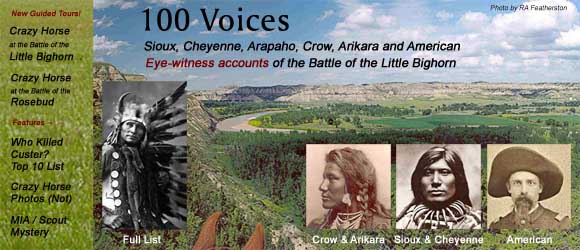
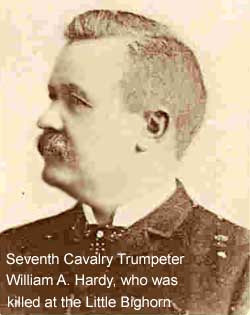 APPROACHING FORD A, Rutten's horse, as soon as he smelled Indians, began to act up badly and he could not control him. The only thing he could do was to continually circle him around the 3 troops. The horse kept this up after passing Ford A and when got down near the skirmish line, the horse lunged ahead of the command and took him considerably nearer the Indians. He therefore circled him around to the right, and came back through the timber and joined command.
APPROACHING FORD A, Rutten's horse, as soon as he smelled Indians, began to act up badly and he could not control him. The only thing he could do was to continually circle him around the 3 troops. The horse kept this up after passing Ford A and when got down near the skirmish line, the horse lunged ahead of the command and took him considerably nearer the Indians. He therefore circled him around to the right, and came back through the timber and joined command.
